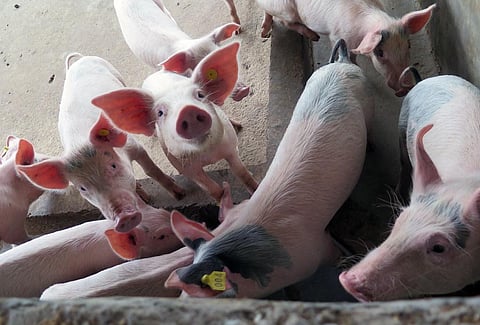‘African swine fever may have come to Arunachal Pradesh, Assam from Tibet’
Pork is an integral part of the northeast Indian cuisine. It is popular among indigenous ethnic Assamese communities such as Sonowals, Bodo, Rabha, Keot (Kaibarta), Ahom, Moran, Sutiya, etc.
Three popular dishes are made using pork — including Pani Hamuk (water snails) — which are cooked with pumpkin or potatoes along with pork and fermented beans in Nagaland. Then there is Dhekia xaak, which is a fiddlehead fern and is cooked along with pork and is part of Assamese delicacy.
Similarly, Axone is the most commonly used fermented beans in Nagaland — it is prepared from soya beans and by people of all tribes, but most notably by the Sumi Nagas of Nagaland. Axone is used to make pickles and chutneys, as well as curries of pork, fish, chicken, beef, etc.
The spread of African swine fever (AFS), the first case of which was allegedly discovered in May in Arunachal Pradesh, has prompted the Assam government to impose ban on the sale and distribution of pork. The current outbreak of ASF is the first time the disease has been reported in India.
Swaraj Rajkhowa, senior scientist (veterinary medicine) and acting director of Indian Council of Agricultural Research-National Research Centre on Pig, Guwahati, speaks to Down to Earth on the subject. Edited excerpts:
Meenakshi Sushma: When was the first case of the African swine fever discovered this year?
Swaraj Rajkhowa: The first case was discovered sometime in May. We think the disease could have spread from Tibet. There have AFS outbreaks in Tibet earlier as well, but it never happened in India.
The initial outbreak started in Arunachal Pradesh, which is near Tibet, and then later from spread to upper Assam region.
MS: How many pigs have died so far?
SR: At least 5,000 of more than two million pigs died in Assam. Arunachal Pradesh has 0.3 million of pigs, according to a recent survey.
MS: What measures are being taken to control the spread of AFS?
SR: We are following the guidelines provided by World Organisation for Animal Health (OIE), which includes detection and humane killing of animals (with proper disposal of carcases and waste), cleaning and disinfecting the affected areas, strict surveillance and biosecurity measures on farms.
MS: What is the ratio of sale of pigs from other states into North East states?
SR: Generally, we fall short in production of pork meat by 50 per cent. We compensate for the shortage by outsourcing the meat from various states such as Uttar Pradesh, Punjab, Rajasthan, etc. But there is a temporary ban on inter-state trade for now.
MS: How is the state managing the novel coronavirus disease (COVID-19) situation and the AFS?
SR: The COVID-19 situation has helped in controlling the spread of AFS as movement of people has been restricted. Currently, only a few districts in Assam and Arunachal Pradesh have been affected. These include Biswanath, Dhemaji, Dibrugarh, Lakhimpur, Sivasagar, and Jorhat.


